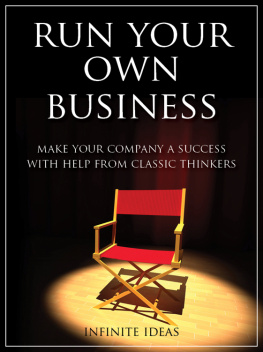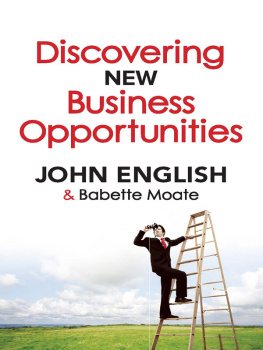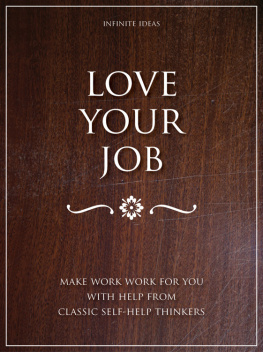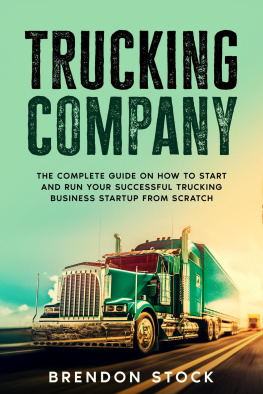Run your own business
Make your company a success with help from classic thinkers
Infinite Ideas

8. Take responsibility
The tenth secret of leadership excellence is the willingness to assume full responsibility. In Think and Grow Rich Napoleon Hill says, The successful leader must be willing to assume responsibility for the mistakes and the shortcomings of his followers. If he tries to shift this responsibility, he will not remain the leader.
Hill goes on to say that, If one of his followers makes a mistake, and shows himself incompetent, the leader must consider that it is he who failed.
One of the most famous recent examples of how to get this wrong would be Enron. When the truth of Enrons fraudulent accounting came out, Chairman and CEO Kenneth Lay wrongly stated that he couldnt possibly be expected to know everything his CFO Andrew Fastow was doing!
When it comes to taking responsibility there can be few better examples than Johnson & Johnsons handling of the 1982 Tylenol crisis. A mainly US product, Tylenol is Johnson & Johnsons own brand of painkiller and accounted for about 35% of market share until seven people died after taking the product. It turned out that a psychopath had decided to contaminate the product with cyanide, clearly no fault of Johnson & Johnson. Yet, far from distancing themselves from the situation, the company took full and immediate responsibility. Thirty-one million bottles of Tylenol were recalled and customers who already had Tylenol were able to swap their products for free. Johnson & Johnson introduced a tamper-proof sealed packaging that has since become industry standard.
Their rapid and open response, spearheaded by CEO Jim Burke, firmly established Johnson & Johnson as a brand leader and a company that was willing to put people before profits. Although the exercise cost them over $100 million, and market share dropped to 7%, the product survived and quickly regained market confidence. Jim Burke recognized that it is the leaders role to assume full responsibility regardless of who is to blame.
This was a lesson that Perrier didnt learn quite so quickly. In 1990 high levels of benzene were discovered in bottles of Perrier, and although the company recalled 160 million bottles worldwide there was an information vacuum. Jim Burke of Johnson & Johnson had been on national TV and the media were kept fully informed; as a result the public were reassured by his visible presence and vocal responsibility. Perrier, on the other hand, didnt know how to react. Their business was built on natural purity and the presence of benzene was neither natural nor pure! They appeared to play things down and isolate the issue, which only served to intensify consumer anxiety for example, although the recall was worldwide they only established a UK call center. Perrier are still in business but their sales never recovered to pre-1990 levels.
Heres an idea for you
Write down three things that went wrong in the last project you were leading. Consider who took responsibility for the project failure, then consider whether you need to make some apologies. If you do, then make them.
Defining idea
Entrepreneurs are risk takers, willing to roll the dice with their money or reputation on the line in support of an idea or enterprise. They willingly assume responsibility for the success or failure of a venture and are answerable for all its facets. The buck not only stops at their desk, it starts there too.
Victor Kiam
9. A treasure trove of wisdom
In Self-help , while constantly applauding personal application and industry, Samuel Smiles also notes the external factors that contribute to greatness. In the case of Jacquard and his loom, Smiles highlights the importance of his time in the Conservatoire, where he had the advantage of minutely inspecting the various exquisite pieces of mechanism contained in that great treasury of human ingenuity.
In a time of frenzied innovation it is all the more important not to waste time reinventing the wheel a message as true in the 21st century as it was in the 1800s. The Conservatoire des Arts et Mtiers in Paris was, and still is, a museum of inventions and prototypes from all fields of engineering and industry. Its probably now most famous as the home of Foucaults pendulum. Jacquard, busily working on his loom design, sufficiently impressed the Emperor to be allowed to use its workshop and there he took the opportunity to study a silk loom invented by Vaucanson. Studying the details of that earlier invention set him upon the track of his discovery.
In effect, the Conservatoire served as a repository of knowledge, carefully indexed and very detailed. Dipping into it saved Jacquard who knows how many years of development time. The problem in modern business is that knowledge is often much more ephemeral and scattered. Companies dont know how much they know and usually dont realize that until some individual a salesperson with intimate knowledge of customers and prospects, for example leaves. As long as accrued wisdom is stored only in the minds (and Post-it Notes) of the individuals doing the learning, it is very hard for the business to profit from it and to make the next step forward when the time comes to innovate.
The answer has to be a shared pool of information the goal of modern knowledge management. That means more than a central database of contact and product information, which should already be stored and accessible. Those kinds of facts only tell a small part of the picture, however. A good knowledge pool, typically held on a company-wide intranet, will also include winning presentations, notes about the particularities of demanding clients, tips on regional differences, customer feedback, and even (rarest and most valuable of all) examples and details of major muck ups so they can be avoided in future. A really good intranet such as Truffles, the in-house repository of advertising giant Ogilvy includes training materials and strategy structures so the next time a client asks you to implement something youve never heard of, at least you know where to start.
Heres an idea for you
Knowledge is power, and people naturally hoard both. Its therefore vital to offer an incentive to encourage people to share. Make your intranet enjoyable and try a ratings system whereby the more people contribute, the higher they are ranked, until they reach expert level. Then pay them. Reward and recognition go a long way to fostering a culture of sharing.
Defining idea
The doorstep to the temple of wisdom is a knowledge of our own ignorance.
Benjamin Franklin
10. Slugs, speedsters and dead sharks
Laziness travels so slowly, observed Benjamin Franklin in The Way to Wealth , that poverty soon overtakes him. The obvious modern interpretation of this is that anyone who takes their foot off the pedal and slacks off is eventually going to find financial worries snapping at their heels.
Fair enough, and as true today as it was back in 1758, but the march of time has added another dimension to Franklins wisdom. Woody Allen famously declared that A relationship, I think, is like a shark, you know? It has to constantly move forward or it dies. And I think what we got on our hands is a dead shark. Replace the word relationship with the word business
Physical laziness is easy to recognize, but intellectual laziness tends to be harder to spot and much easier to disguise with rationalizations. With the rapid pace and constant evolution of todays business landscape, simply working hard is not enough to guarantee success. The truly successful are also constantly scanning the horizon for new opportunities and threats.
Next page













